A humidifier is an electrical appliance that releases moisture into the air to raise the humidity level of a room.
Dry indoor air is a major contributing factor to skin problems, allergies, sleeplessness, and colds. It also has a detrimental effect on furniture, wood floors, houseplants, and more.
There are hundreds of humidifiers on the market today. We put dozens of the most popular ones to the test and determined that the following are the best humidifiers of 2023.
Rankings
1. Levoit 6L Ultrasonic Humidifier
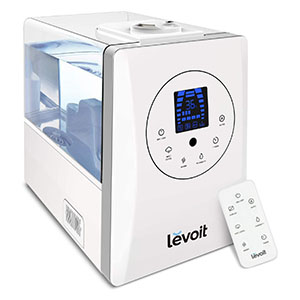
Click here for the lowest price on Amazon
The Levoit 6L Ultrasonic Humidifier takes versatility a step further by offering both cool and warm mist settings. It can also be used as an aroma diffuser. With its 750 square foot rating, it is the perfect humidifier for the living room.
What we like: The best large room humidifier we tested. The LV600HH keeps your 750 square feet room livable for up to 36 hours at a time. Remote control is seamless, the display panel clear, and you can use the LV600HH as an aroma diffuser if you wish.
Flaws: Some unnecessary bells and whistles. And it is not the cheapest humidifier on the market.
2. Honeywell HCM350W Cool Mist
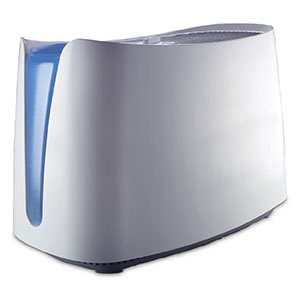
Click here for the lowest price on Amazon
The Honeywell HCM350W Cool Mist treats the water with UV light to remove bacteria before dispersing it into the air. It has a sleek profile that does not call attention to itself, which makes it a sound choice for the living room.
What we like: Typical Honeywell quality. 24 hours of continuous operation on a full tank. UV light in the tank kills up to 99.9% of bacteria. The wicking filter distributes the moisture quickly and effectively.
Flaws: The filter does not last very long. Not as quiet as it is made out to be.
3. Honeywell Designer Series Cool Mist Humidifier
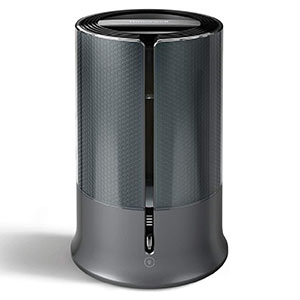
Click here for the lowest price on Amazon
If you like your appliances to embody leading-edge design, you will love the Honeywell Designer Series Cool Mist Humidifier. Ultra-quiet, customizable, and easy to clean, it’s more than just a pretty face.
What we like: This may be the best looking humidifier on our list. Fortunately, performance lives up to the looks. It can be used as a straight-up humidifier or an aroma diffuser. A great choice for mid-sized rooms.
Flaws: Not the quietest humidifier out there. And definitely not for a large room.
4. Geniani Top Fill Cool Mist Humidifier
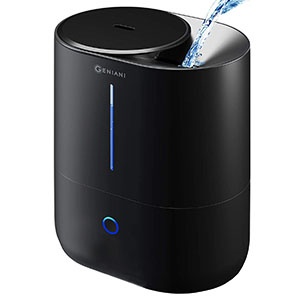
Click here for the lowest price on Amazon
The Geniani Top Fill Cool Mist adjusts the humidity for you automatically while you sleep or watch TV or nap on the sofa. Add some essential oil to complete the picture.
What we like: The auto-adjusting humidity control on this unit is more than a gimmick. It works like a charm so you can easily maintain the humidity level you want. Features auto-shutdown and acts as an aroma diffuser as well. Great for the office or bedroom.
Flaws: The area around the base will get wet, so do not set it directly onto wooden tables or nightstands.
5. Venta LW25 Airwasher
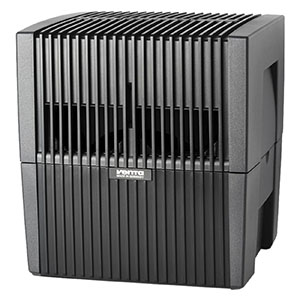
Click here for the lowest price on Amazon
What it lacks in looks the Venta LW25 Airwasher more than makes up for in performance. It is energy-efficient, quiet, dependable, low maintenance, and effective. It is also more expensive. But, in this case, you get what you pay for.
What we like: Does an outstanding job on large rooms. Remarkably quiet for such a powerful unit. Features auto-shutoff, does not need constant cleaning, and has a 10-year warranty. The LW25 is quiet, dependable, and built to last.
Flaws: Looks like a CD holder/bread box.
6. TaoTronics 4L Cool Mist Humidifier
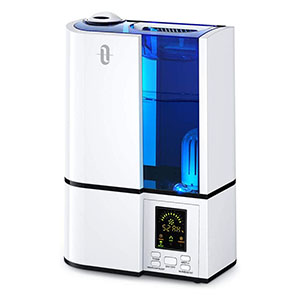
Click here for the lowest price on Amazon
The Tao Tronics Cool Mist Humidifier is what a humidifier should be: well-engineered, well-built, affordable, and dependable. With adjustable humidity levels and auto-shutoff, you can use it with confidence in any room of the house.
What we like: Get up to 32 hours of continuous run-time from this humidifier. It also provides real-time humidity readings and allows you to switch easily between mist levels. In addition, the unit has a nice solid feel to it and is remarkably quiet.
Flaws: The design is not going to dovetail with most people’s living room decor.
7. Vicks Warm Mist Humidifier
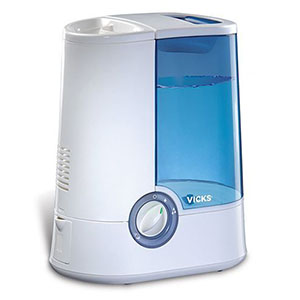
Click here for the lowest price on Amazon
Vicks manufactures their humidifiers to work in sync with their VapoSteam and VapoPads products. But you can just as easily enjoy it for its stand-alone effectiveness.
What we like: A simple design that is quiet and dependable. The warm mist it produces makes the room more comfortable and is gentle on your respiratory system. The fact that it is dishwasher safe is a major plus.
Flaws: Can create moisture issues around the base, so do not set it up on a wooden table or nightstand.
8. Vornado Evap40
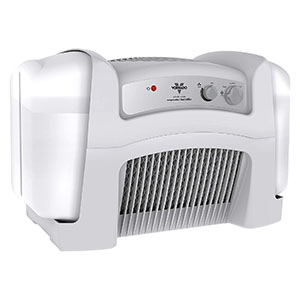
Click here for the lowest price on Amazon
The Vornado Evap40 is not particularly stylish, nor particularly discreet. But it will add just the right amount of moisture to the air in your loft or other wide-open living space without breaking a sweat.
What we like: Built for large rooms the Evap40 does not disappoint. With three mist settings and an adjustable humidistat, it offers precise control. The large tanks are engineered to discourage leaks and will provide 24 hours of continuous use.
Flaws: When dealing with large rooms, the humidistat reading can be a bit unreliable.
9. Pure Enrichment MistAire
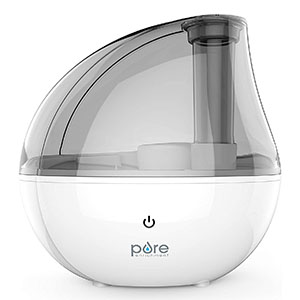
Click here for the lowest price on Amazon
This iteration of the MistAire features quieter operation than earlier versions, making it a good choice for the kid’s room or the home office.
What we like: Not the most powerful humidifier but one of the most effective. It provides cool mist moisture for spaces up to 250 square feet. With automatic shut down and 12 hours of operation, it is an outstanding choice for an office or a small bedroom.
Flaws: The attractive but impractical design makes it a pain to clean.
Who Needs a Humidifier?
Anyone who finds themselves with dry, cracked skin during the wintertime should get a humidifier. Anyone with allergies that are aggravated by dry winter air – or dry air-conditioned air during the summer – should consider a humidifier. If you have wooden flooring or furniture in your home, you should consider getting a humidifier to prevent it from drying out and cracking.
Anyone who has a hard time sleeping due to a dry nose, sore throat, or respiratory distress should consider a humidifier. And anyone concerned with keeping potentially harmful dust particles and virus molecules from circulating through their home should get a humidifier.
How We Ranked
To determine which humidifiers are the best on the market today, we examined scores of the most popular models, and sifted through thousands of customer reviews.
We began with the assumption that most people would place a humidifier in their bedroom. As such, a humidifier could not be so loud that it would keep you awake at night. We also checked to see if the humidifier lived up to its rating. That is, if it was rated for a 600 square foot space, did it actually work in that size space?
Build quality was another concern. Most humidifiers today are made of plastic. That’s fine as long as they are engineered to close tolerances, and the plastic is of a high quality. If a humidifier was leaky, squeaky, or fragile, it did not rank for our list. Finally, while we do not expect humidifiers to be particularly beautiful, they should be stylish enough that they do not detract from your decor.
FAQs
Q: What does a humidifier do?
A: A humidifier is an electronic device that adds moisture to interior spaces. Humidifiers are not centralized devices, but can be easily moved from room to room if need be, and can add a cool or warm mist to the air. Elevating the humidity in a room can alleviate allergy symptoms, prevent dry, cracked skin, save your wooden furniture, bolster the health of your houseplants, and more.
Q: Why should I get a humidifier?
A: Cold, winter air is not as moist as warm summer air. It may be invigorating, but it draws moisture out of your skin like a vacuum cleaner. If you do not do something about that lost moisture, your skin, your respiratory system, and everything in your house is bound to suffer the consequences (1). Keep in mind, too, that air conditioning during the summer can have the same net effect as cold winter air.
Q: Is there an ideal humidity level?
A: Most experts agree the ideal humidity level is between 30% and 50% (2). If the air is any drier than that (as it often is in the winter), the skin inside the nose can crack and become susceptible to penetration by the rhinovirus (3) that causes what we refer to as the common cold. Humidity greater than 50% can promote the growth of mold and bacteria, and make your home a breeding ground for dust mites (4) and other microorganisms.
Q: Where should I put a humidifier?
A: A humidifier can be placed in any room in the house. People typically place them in the bedroom, since they tend to spend more time there than in any other room. The one thing you should not do is place the humidifier near a heat vent or register. Most modern humidifiers have built-in sensors that detect the amount of humidity in the air. If the humidifier is placed too close to a heating vent, it can negatively affect the accuracy of the reading.
Q: Are humidifiers heavy?
A: No, most humidifiers are light enough (when empty) for any healthy adult to carry. Even large units will not weigh more than about 12-15 pounds. Again, when empty. Adding water greatly increases the weight, since a gallon of water weighs just over 8 pounds. If you plan to move your humidifier, remember not to try and lift it by the handle on the water tank, since most water tanks are designed to separate from the rest of the device for easy cleaning.
Q: Can a humidifier help with allergies?
A: Winter air is naturally dry. But when dry winter air is subjected to artificial heat in your furnace, it becomes even drier. That can lead to all kinds of respiratory issues, aggravate allergies, and even trigger asthma attacks. So, the answer is yes, a humidifier can help with allergies by preventing your sinuses and respiratory tract from drying out.
Q: What size humidifier should I get?
A: The size of the humidifier you get will depend on where you intend to use it. Every humidifier is rated to cover a certain amount of square footage. So when shopping for a humidifier it is important to pay attention to the recommended coverage. You can figure out how many square feet you need to cover by measuring the room where you intend to place the humidifier. Multiply the length by the width to get the square footage.
Q: What is the white powder around the humidifier?
A: People are often confused and alarmed when they see a white powder building up on the humidifier. But it is actually nothing to be concerned about. The white powder is minerals that were in the tap water you used to fill the humidifier tank. When the water was vaporized, they separated and came to rest on the humidifier filter or the vent where the moist air exits the device.
Q: What is hard water?
A: Tap water with high concentrations of calcium, magnesium and other minerals is called ‘hard water’ (5). The more minerals, the harder the water. The harder the water, the more white powder you will see on your humidifier. How hard or soft your tap water is will depend on where your city or town gets their drinking water. Well water tends to be ‘harder’ than water from lakes.
Q: How do I know if I have hard water?
A: You do not need to have a humidifier to find out if you have hard water. If you see white, chalky deposits in your dishwasher, or the same on your water faucets, it is an indication of hard water. If soap does not seem to lather up effectively in the shower, it can indicate hard water. And if your clothes never seem to come out of the washing machine completely clean, it may indicate hard water.
Q: Why is my humidifier suddenly leaking?
A: Unless you recently dropped the humidifier of the water tank, the most likely cause of sudden leaks is that the tank was simply not seated properly on the humidifier. If the humidifier seems to be leaking from the bottom, lift it back up and try placing it again and see if the leaking stops. If it does not, and there are no obvious cracks in the tank, contact the manufacturer.
Q: Do I have to clean my humidifier?
A: The humidifier water tank will need to be cleaned on a regular basis to prevent the buildup of mineral residues, and to prevent mold, mildew (6) and bacteria from taking hold. If you use the humidifier on a regular basis, you should clean the tank every few days. It typically does not take long and can be done using a soft bristle brush and a mild detergent. Consult your owner’s manual for exact details on how to clean your unit.
Q: What is a warm air humidifier?
A: A warm air humidifier uses a heating element to heat water from the tank before vaporizing it. This ensures a warm mist is dispersed throughout the room. There is some disagreement among health professionals over whether or not warm air humidifiers provide any additional benefits (7) over cool water humidifiers.
Q: How often do I have to replace filters?
A: Those humidifiers that provide cool moisture use filters that will typically need to be replaced every couple of months (see your owner’s manual for specific instructions). Warm mist humidifiers do not use filters. Nor do ultrasonic humidifiers, although warm mist humidifiers will need to be cleaned regularly to prevent mold and bacterial buildup.
Q: What does humidifier capacity mean?
A: The capacity of a humidifier is the amount of water the tank can hold. So, if the humidifier says it has a 5-liter capacity, the water tank can hold 5 liters of water at any one time.
Q: What is a humidistat?
A: The humidistat (often referred to as the hygrostat), measures the humidity of the air. In other words, the amount of moisture in the air. This is important because too much moisture can promote the growth of dangerous molds and bacteria. And too little moisture can lead to myriad health problems, while at the same time damaging wooden furniture, houseplants, and other items.
Q: What is the difference between a warm air humidifier and a vaporizer?
A: Both a vaporizer and a warm air humidifier vaporize water by heating it and then release that warm vapor into the air. In today’s market, the term ‘vaporizer’ typically refers to old-fashioned humidifiers that are short on high tech features. While ‘warm air humidifier’ refers to a modern, energy-efficient humidifier with a humidistat, removable tank, and other features.
Q: What are essential oil humidifiers?
A: Some humidifiers can be used to add a pleasant aroma to the room. This is done by adding a few drops of your favorite essential oil (8) to the water. But be aware not every humidifier is designed to work as an aroma diffuser. Also, humidifiers that accept essential oils need to be cleaned regularly to prevent the buildup of oily residue in the water tank.
Q: Why does the air in my home get so dry?
A: Even the largest, most expensive homes can dry out like a prune during the wintertime. Cold air simply is not able to hold as much moisture as warm air. So when the north wind begins to blow, humidity drops. In addition, applying artificial heat sources to the air inside a home tends to remove whatever small amount of moisture was in that air. So the air that emerges from your heating vents may have less than 10% humidity.
Q: Why are my windows foggy when I run the humidifier?
A: If you notice condensation on your windows while running the humidifier, it is usually an indication that the air is too moist. If your humidifier has an integrated humidistat, you can adjust the settings downward. If the humidifier does not have any way to adjust the level of humidity, then you may have to lower the output or simply turn the device off for a while until you see the condensation disappear from the windows.
Q: What are the dangers of too much humidity?
A: If your humidifier is pumping out too much moisture, it can promote the growth of mold and mildew as we said earlier. But more than that, excess moisture in the air can damage upholstery and wallpaper, produce a musty smell throughout the house, and aggravate allergies and asthma. Ideally, you want the humidity in your home to hover between 40% and 50%.
Related Articles
Recap
A humidifier provides an array of benefits for health and home. It can prevent dry winter air from aggravating asthma and allergies, prevent viruses from infiltrating your home, prevent your skin from drying out and cracking, and save your expensive wooden furniture and flooring from being ruined.
A humidifier can also create an environment that is much more amenable to sleep, and much more agreeable for houseplants. All in all, a humidifier is an affordable, common-sense tool for creating a healthy environment that benefits everyone. Use the information provided above to make an informed decision regarding which of our best humidifiers of 2020 is just right for you.
For cpoe.org’s #1 recommended humidifier, click here.

